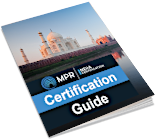your one-stop certification solution!
What is the AIS/TAC Certification for India?
AIS is short for “Automotive Industry Standards”, which are the technical automotive standards for India. The India Central Motor Vehicles Rules (CMRV) provide the basis for the conditions under which automotive products in India can obtain a Type Approval Certificate for the Indian market. The Type Approval Certificate (TAC) is required for products and components that must fulfil special technical and safety requirements. These components receive a TAC certificate after passing the certification process. The purpose of this certification system is to improve road safety in India by ensuring the quality of transportation.

The AIS certification or Type Approval Certificate (TAC) was introduced in 1989 together with the Central Motor Vehicles Rules (CMVR). The Automotive Industry Standards are based on the UNECE standards. The CMVR include rules and regulations related to the registration of vehicles, traffic controls or the production and maintenance of motor vehicles and more. The Automotive Industry Standards (AIS) are issued by the Ministry of Road Transport and Highways (MoRTH), which is the ministry that regulates the automotive sector in India. Type Approval certification happens at two levels, component level and whole vehicle homologation. Components that need to be certified under AIS guidelines must have completed the component level process before complete vehicle homologation can be started.
For automotive components, both the product itself and the Conformity of Production (CoP) are considered. After completion of the certification, the Type Approval Certificate (TAC approval, TA certificate) is issued. The Type Approval Certificate can be issued in India by various certification authorities such as ARAI or iCAT.
What is the difference between ARAI certification, AIS approval and TAC registration?
TAC certification is often referred to as AIS certification or ARAI certification, or other variations like ARAI approval, ARAI registration, AIS registration, Conformity of Production (CoP) Certification or TA Certificate. These terms always refer to the same certification.
AIS Certification Authorities
There are various certification authorities in India that can perform AIS registration and issue Type Approval certificates. The main ones are:

ARAI is the most well known authority for the certification of automotive parts in India, which is why its name is mentioned frequently, and the AIS certification is also sometimes referred to as ARAI approval or ARAI certificate. Here is our news on recent interactions between MPR International and ARAI.

Since 2021, ICAT and MPR International have partnered through a special cooperation agreement. This makes certification processes faster and more efficient for our customers. Please find more information here.
Which products are covered by AIS certification?
AIS/TAC certification is required for automotive safety-relevant components.
Currently, this applies to the following products:
- Lamps
- rear view mirror
- fuel tanks
- reflectors
- Drive battery (traction battery)
How does the process for the ARAI Registration in India work?
The AIS-037 specifies the AIS certification process.
The certification process differs depending on the type of product. In the case of safety-relevant components, the product must be tested in India and the production line must also be audited on site at the manufacturer’s premises. Under certain circumstances, the tests for electromagnetic compatibility of automotive electronics can also take place through so-called witness tests at the manufacturer’s premises and do not have to be carried out separately in India.
Preparation of application document and submission of the application
Factory Audit
Product Test
Certificate
If needed: Marking of the product
The product testing as well as the certification itself can be completed with different authorities, such as ARAI (Automotive Research Association of India or ICAT (International Centre for Automotive Technology). The ARAI approval process according to the Indian AIS (Automotive Industry Standard) can be complex to navigate. Efficient communication with the Indian authorities as well as accurate preparation of all applications and supporting documentation and test samples are essential for the successful AIS registration.
AIS Approval – Marking
The regulations for product marking depend on the individual product categories. There are products such as fuel tanks or door hinges that do not have to be marked. For other products, there are very precise regulations as to what information must be entered on the AIS certification mark and where it must be affixed. Often, the AIS type-approval number must be marked, as well as brand or manufacturer names.
AIR (Authorized Indian Representative)
The application for AIS certification must always be submitted by an Authorised Indian Representative (AIR). This is a representative in India authorised by the manufacturer who acts as a contact for the authorities and is responsible for submitting applications.
Your One-Stop Certification Solution.
Our complete package for product certifications for India.
Personal consultant for all questions about AIS
Clarification of the certification requirements
Application preparation
Handling of all communications with the certification authority
Organization of testing
We provide a local Authorized India Representative (AIR)
Preparation and support for the audit
Advice on how to mark your products, if needed
Complete organization of the follow-up certification
Contact us!
 MPR India Certification – expert consulting and implementation of certification projects worldwide.
MPR India Certification – expert consulting and implementation of certification projects worldwide.
AIS Certification Overview
| Validity of the Certificate | 2 years |
| Certification Estimated Timing | 5-6 months |
| Marking | Depending on the product category |
| Testing Required? | Yes |
| Factory Audit Required? | Yes |
| Representative in the country | AIR (Authorized Indian Representative) required |
| Follow-Up Process | Follow-up inspections are conducted every two years |
AIS Certification FAQ
You can check our list of AIS-required products. We also recommend checking with certification bodies such as ICAT and ARAI, as Indian standards and regulations change frequently. We can support you with this.
For the initial AIS certification, a factory audit is mandatory. Therefore, the certification process takes about five to six months.
The certificates are valid for two years.
The ARAI certification for India is carried out according to a specific AIS standard. We recommend that you study the relevant product standard in detail and initiate any measures or adjustments that may be necessary. We will be happy to help you if you have any questions.
The required audit before obtaining the ARAI certificates always takes place at the production site of the product. If production takes place at several locations, the plant where the last quality-assuring production step takes place must be audited.
The marking requirements for AIS depend on the product category and are product specific. Many AIS-certified components must be marked with a corresponding label. According to the relevant AIS standard, the label must contain the following information: Brand/manufacturer name, a unique ID code, the AIS type approval number and the marking required by the standard.
No, information on TAC approvals is provided in English on the website of the Ministry of Road Transport and Highways (MoRTH). Companies are obliged to inform themselves about changes if they have not contracted a consultancy firm to monitor changes.
AIS CERTIFICATION VIDEO
Please enable cookies to enable embedded YouTube videos. For privacy-related details on data exchange through use of the videos as well as changeable cookie settings, please see the privacy policy page.
Client Testimonials
Please enable cookies to enable embedded YouTube videos. For privacy-related details on data exchange through use of the videos as well as changeable cookie settings, please see the privacy policy page.








